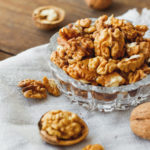Best of 2016: 4 Foods Bad For Your Heart

Want to keep your heart healthy? Minimize these inflammatory aggravators in your diet to help promote optimal cardiovascular functioning.
- Trans-fats. Found in nearly all margarines, snack foods, processed foods as well as some cooking oils, these fats (often listed on food labels as “hydrogenated” or “partially hydrogenated” oil) can reduce HDL (“good”) cholesterol levels and raise LDL (“bad”) cholesterol levels. Also, avoid heated polyunsaturated fats, such as soybean oil used for deep-frying. These fats are oxidized; consumption may have a variety of negative and inflammatory health effects.
- Animal protein. Excessive animal protein has been shown to raise levels of homocysteine, an amino acid that in high concentrations may contribute to heart disease. Instead of animal protein, try whole soy protein – aim for two servings of whole soy, such as tofu or edamame, per day.
- Refined carbohydrates. Cookies, cakes, crackers, soft breads, chips and sodas can increase triglyceride levels and lower HDL.
- Sodium. Excessive sodium has been linked to high blood pressure and heart disease. The main concern for sodium intake is processed and canned foods, along with restaurant fare. Adding a dash of salt to your homemade meals is negligible in comparison and may help provide enhanced flavor to keep you eating more at home.
Today’s Health Topics
Editor's Pick
Health Focus
Ask Dr. Weil's Q&A
Protecting Your Health Via Your Diet
Do you know which foods can help support and protect your immune system? Find out at Dr. Weil on Healthy Aging. Learn how different foods - along with supplements and exercise - can benefit your health: start your 14-day free trial and save 30% when you become a member!










